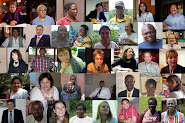
Mahatma Gandhi was famous for powerful sayings and even more powerful actions. He said, “Poverty is the worst form of violence.” He acted on convictions like, “We must become the change we want to see in the world.”
On a recent visit to India I witnessed first hand the violence of poverty and the creative power of individuals becoming change.
The rural poor of India – especially women – are extremely limited in their power when they stand alone. One might work all day and earn the equivalent of a single US dollar. Most of that will be immediately spent on the necessities of life – food, clothing, and shelter. What is left over (sometimes pennies) provides almost no buying power.
The self-help group enables women to stand together and as a collective they increase their power. The left-over pennies at the end of a days work from fifteen to twenty women can buy household supplies, can be saved for a week or two weeks to buy raw materials for a business.
Non-government organizations (NGOs) across India have seen the power that self-help groups can provide and are doing what they can to foster the creation of more and more of these collectives. One NGO that we met with in New Delhi, PRADAN, has worked with more than 10,000 self-help groups (SHGs) across seven states in India, representing a total membership of more than 150,000 rural poor women. These SHGs have mobilized a total savings of 6 million US dollars.
Each SHG is typically assigned a mentor. The mentor promotes the self-help group concept at the community and village level and coordinates the meetings. Leadership roles are assigned like group leader, secretary, and treasurer. A pattern for saving money is established and the group talks together to decide how they will spend the money. Sometimes money may be loaned to serve individual house-hold needs. A group may decide to create a common business and use their collective purchasing power to support the business. A single mentor in a village quickly becomes the change they want to see.
How do these women navigate the complexities inherent as a large group of people come together around a common piece of work? How do they agree on a shared vision for what to do in the future (Direction)? How do they map their existing resources and pull together to meet the challenges (Alignment)? How do they set realistic and tangible goals that they can achieve along designated milestones (Commitment)? These are fundamental principles of leadership.
NGOs like PRADAN help these women dream of what the future can be. They help the group assess their current situation. They provide tools and models for dealing with the conflict and communication issues that will inevitably come up as a diverse group wrestles with consensus and the need for giving and receiving feedback.
Our goal is to provide these NGOs with the very best tools in the world to make these mentors and the self-help groups they serve successful. We want to reach hundreds of thousands of grassroots leaders – the rural and urban poor. When we all stand together there is an even greater power to change the world.



















1 comment:
Very inspiring post. You've put really a lot of effort into all this. Thank you for that and keep on doing this fantastic job!!! See more at:- http://www.blanchardinternational.co.in/
Post a Comment